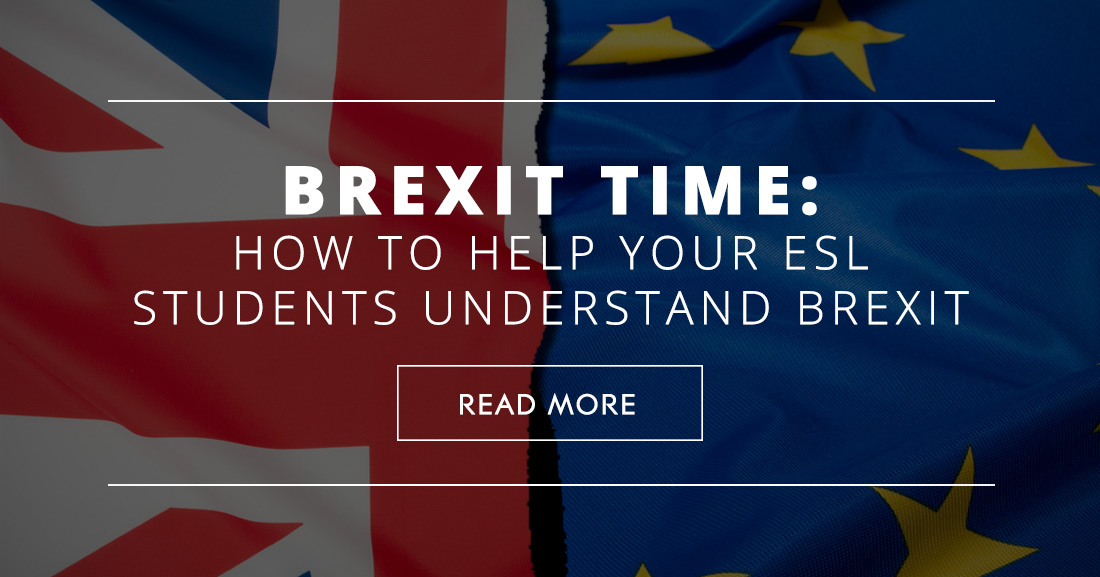Teaching ESL Presentation Skills: How to Engage an Audience like the Professionals


Against expectations, a majority of British voters expressed a desire to leave the European Union (EU), the association of 27 member states to which Britain had belonged since 1973. As the first country to vote leave the EU, Britain has set a startling precedent, and various departments and organizations are now running to catch up.
The vote for ‘Brexit’ (a popular portmanteau or ‘word merger’ of ‘British’ and ‘Exit’) is a remarkably revealing moment in British history, and is an instructive opportunity to look at modern British life, the issue of federalism and closer relations between countries, and to try to unpick just why the British public voted as they did.
This extended lesson plan is intended to help you understand what happened, and to communicate the main points to your students. Useful vocabulary is highlighted in bold. Resources and links are included, and comments (preferably of a non-political nature!) are very welcome.
The British Prime Minister, David Cameron, first promised a referendum on Britain’s membership of the EU in 2013. Although he himself, and many of his closest colleagues, are pro-European and would have preferred simply a renegotiated relationship with the EU, the ruling Conservative party, of which he was leader, had been riddled with division and infighting over the European question for decades. Cameron saw the offer of an in/out referendum as way to calm the euro-skeptic wing of his party and remove a painful political irritant.
Show your students a map of Europe and ask them to characterize Britain’s geographical position within it. They might note that Britain appears to be on the edge of the continent, separated from the remainder of the EU by the English Channel and North Sea. The only other EU members which are islands are Cyprus and Malta. This is significant, and reflects a long-standing sense in which the British have stood within Europe but apart from it in important ways. Britain was the only combatant nation in Europe not occupied by Nazi Germany, and even today, this and other historical strands set Britain apart from her European allies. Your students should understand that there has been a long history of euro-skepticism which feeds off perceived major differences in character and lifestyle, as well as centuries-old disputes over sovereignty, fishing rights, ancient battles, royal accession, and other (sometimes apparently trivial) cultural matters.
Any compendium of TV news interviews with British voters during the run-up to the 2016 referendum will provide ample evidence of just how frustrated some people had become with the EU. It was seen as monolithic, unresponsive, and above all bureaucratic. In an echo of the famous complaint, “What have the Romans ever done for us?” from Monty Pythons’s Life of Brian, the public wondered just what meaningful and positive contributions the EU had made to British life.
The referendum was, in many ways, an adjudication on the rule of David Cameron as Prime Minister. His controversial and deeply unpopular cuts to public services - a policy known as ‘austerity’ - alienated and infuriated the working class in particular. They believed that these cuts fomented inequality and denied opportunities to those living in impoverished areas. It is no accident, in my view, that some of the most vehement ‘Leave’ votes were cast in areas blighted by industrial decline, unemployment and poor education.
A central complaint was immigration. Have your students evaluate the ethnic makeup of Britain, and research just how many EU nationals live there. In many ways, Britain is a place of contradictions - I write as someone who grew up in the UK - and your students should be aware that, alongside cherished values of tolerance and openness, there are concerns that Britain is changing faster than its population would like, and that migrants have failed to integrate. Many of Britain’s major cities have seen very visible and wrenching changes in demographics as migrants from the Commonwealth of ex-Empire nations, first the Indian sub-continent and Caribbean, Africa and Asia, and later also from the EU, fundamentally altered the optics of the British high street. New languages are spoken and new cultural trends practiced, all while older ‘British’ traditions are on the wane.
Many ‘Leave’ voters have angrily refuted allegations of racism, though the rhetoric of the Leave campaign deliberately targeted those who believed Britain already hosted too many migrants. Investigate this with your students. What makes a person ‘British’, or ‘American’, or ‘Japanese? Is it their language, behavior, or attitudes? Or simply the location of their birth? Can a migrant who gains citizenship claim to be as much a citizen as someone who is native-born?
Then, turn to immigration. Establish that immigration is driven largely by economic concerns and the availability of suitable jobs in the new country. Ask your students whether they would consider living in a different country in order to earn a better salary, even if the work was picking fruit, sorting recycling, peeling vegetables, or any of the myriad, largely low-paid jobs we now relate almost exclusively with migrants.
The very definition of ‘hard-fought’, the campaign by both sides to influence voter opinion in the lead-up to the referendum dominated the media, as well as private conversations and even church services. The ‘Leave’ campaign, headed most visibly by the Conservative MP (and flamboyantly colorful character) Boris Johnson, made extensive use of statistics and appeals to the emotions, assuring British voters that the UK could flourish once the shackles of EU membership were released. The ‘Remain’ campaign, lead by the Prime Minister, David Cameron, listed the benefits of EU membership, but failed to make a lasting emotional connection, or to convince voters that the EU could play a positive role in their lives.
TV interviews are very revealing here, and are also an excellent way to practice these concepts with your students. Arrange pairwork or team exercises in which groups of voters with different views are asked for their opinion on the EU. Some might be pro-EU - they travel frequently, enjoy foreign food, wine, music and culture, embrace federalism and a closer economic and social union. Others might be anti-EU - they oppose migration, would prefer that Britain makes its own decisions, and believe that membership of the EU is an expensive and unnecessary luxury.
Here’s the basic breakdown:
Remind your students that the United Kingdom of Great Britain and Northern Island, to give the UK its formal title, is a union of four partners: England, Scotland, Wales and Northern Ireland (sometimes called Ulster). This is a good time to point out that Ireland is a sovereign, independent nation, and has been since 1922, when the British left, save for continued rule in the six counties of Northern Ireland. Note that, in many of your students’ first languages, England, Great Britain (the UK without Northern Ireland) and The United Kingdom are all the same word, so take care.
An analysis of the vote itself is very revealing. By a surprising majority, England voted to leave the EU, as did Wales. However, Northern Ireland and Scotland did not, and this immediately prompted fears of a constitutional crisis. Scotland had voted to remain part of the UK as recently as two years prior, rejecting calls for independence, and this debate was swiftly renewed after the EU referendum. It is now considered “highly likely”, in the words of Scottish Nationalist politician Nicola Sturgeon, that Scotland will be given a second opportunity to vote on leaving the UK, so that it can remain part of the EU in the post-Brexit world.
It was anticipated by pollsters, politicians, media figures, and virtually everyone in the days before the referendum that the UK would vote to Remain. As it became obvious that the British public was voting to Leave, the political implications were swift. David Cameron, his vision for remaining within Europe now in tatters, resigned and was replaced by Theresa May. A new government department was set up to make Brexit arrangements, and a two-year clock began on negotiations with the EU to extricate the UK from treaties, trade agreements and other trappings of its EU membership.
Ask your students to visualize the concerns of the following types of people as Britain prepares to leave the EU:
The opportunities for reading, research, presentations, debates and written work are numerous. Here are some recommendations:
Brexit is complex, controversial and many-faceted, and I hope that it provides terrific language-practice opportunities for your students, as well as a clearer understanding of a bold, speculative and fascinating political decision.